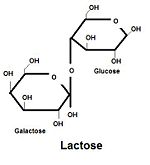Lactose: Difference between revisions
Jump to navigation
Jump to search

imported>Robert Badgett No edit summary |
imported>Noah Ready-Campbell No edit summary |
||
| Line 3: | Line 3: | ||
Commonly known as "milk sugar", '''lactose''' is a [[disaccharide]] sugar made up of the two [[monosaccharide]]s, [[glucose]] and [[galactose]]. It has many uses, among them being a common solid vehicle for binding small amounts of drugs into a tablet form that can be handled. | Commonly known as "milk sugar", '''lactose''' is a [[disaccharide]] sugar made up of the two [[monosaccharide]]s, [[glucose]] and [[galactose]]. It has many uses, among them being a common solid vehicle for binding small amounts of drugs into a tablet form that can be handled. | ||
A significant number of people have [[lactose intolerance]], or the usually genetic but sometimes acquired lack of the enzyme [[lactase]]. The unabsorbed lactose then is fermented by intestinal bacteria, which produce acid and gas. These byproducts may cause anything from mild discomfort to severe [[diarrhea]]. | A significant number of people have [[lactose intolerance]], or the usually genetic but sometimes acquired lack of the enzyme [[lactase]]. The unabsorbed lactose then is fermented by intestinal bacteria, which produce acid and gas. These byproducts may cause anything from mild discomfort to severe [[diarrhea]]. Lactose intolerance typically develops after childhood. | ||
Latest revision as of 12:42, 18 July 2010
Commonly known as "milk sugar", lactose is a disaccharide sugar made up of the two monosaccharides, glucose and galactose. It has many uses, among them being a common solid vehicle for binding small amounts of drugs into a tablet form that can be handled.
A significant number of people have lactose intolerance, or the usually genetic but sometimes acquired lack of the enzyme lactase. The unabsorbed lactose then is fermented by intestinal bacteria, which produce acid and gas. These byproducts may cause anything from mild discomfort to severe diarrhea. Lactose intolerance typically develops after childhood.
